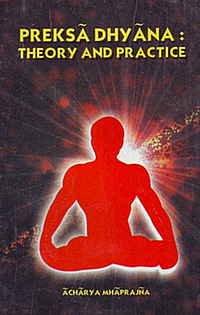 | About: |
| Preksa-dhyana is a technique of meditation for attitudinal change, behavioural modification and integrated development of personality. It is based on the wisdom of ancient philosophy and has been formulated in terms of modern scientific concepts. We hope that the synthesis of the ancient wisdom and the modern scientific knowledge will help us in achieving the blissful aim of establishing amity, peace and happiness in the world by eradicating the bestial urges such as cruelty, retaliation and hate.
The different methods of preksa (i.e. perception) include svasa-preksa (perception of breathing), sarira-preksa (perception of body), chaitanya-kendra-preksa (perception of psychic centres), etc. All these are methods of ultimate transformation in inner consciousness, where, there is no need to sermonize for adopting virtues and giving up evils. When one starts practising perception, one experiences himself that he is changing, that anger and fear are subdued, that one is getting transformed into a righteous person.
Benefits of Preksa Dhyana
Preksa may appear to mean different things to different people because it contributes to increase physical, nervous as well as spiritual energies.
On the physical level, it helps each bodily cell to revitalize itself; it facilitates digestion; it makes respiration more efficient and improves circulation and quality of blood.
On the mental level, it proves to be an applied method to train the mind to concentrate; it cleans and relaxes the mind; it offers a way to treat serious psychosomatic illness without drugs; it is an efficient tool for ending addictions and other bad habits; it reveals to one the mysteries of his mind by the realization of the real subconscious and the unconscious.
On the emotional level, the strengthening of conscious reasoning controls reactions to environmental conditions, situations, and behaviour of others; harmonization of the functioning of nervous and endocrine systems result in control and ultimate eradication of psychological distortions.
On the spiritual level, the firm control of the reasoning mind, regulation and transformation of blood-chemistry through proper synthesization of neuro-endocrinal secretions, and production of dispassionate internal vibrations lead one to attain freedom from anguish and infatuation, and to become free from the effects of mental afflictions and torments.
| |
| Author: | Acharya Mahaprajna |
| Publisher: | Jain Vishwa Bharati, Ladnun, India |
| Editor: | Muni Mahendra Kumar |
| Translators: | Muni Mahendra Kumar, Jethalal S. Zaveri |
| Edition: | Second Edition, 2008 |
| Read online: | |
| Bookshop: | Preksha Dhyana: Theory and Practice |
| Pages: | 128 |
| Dimensions: | 13.90 x 21.40 x 0.90 cm (W x H x D) |
| Weight: | 166 g |